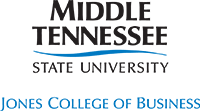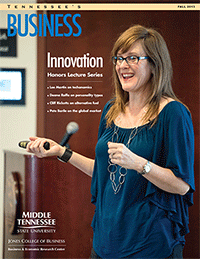Commentary on Innovation
|
The term innovation is currently hot in the business world. Although it is somewhat hard to define, it seems to refer to the introduction by a business of any kind of a new process, method, or tactic to boost its chance of success in a competitive environment. In short, business owners and managers are willing to think outside the box or the normal, customary way of doing things. Recognizing that rapid change is a given in today's world, innovative leaders are willing to create and risk in order to stay ahead of the change curve. There are numerous examples of innovative businesses or approaches in the Nashville area. For example, Vanderbilt molecular biologist Laurence Zwiebel and his team discovered a new way to repel mosquitoes with an insect repellant they named Allosteric Against Number One. Their compound overwhelms the mosquito's sense of smell rather than masking the scent of humans as DEET, the usual industry standard, does. An implication for Zwiebel's research is eradication of malaria in the developing world. Another Vanderbilt professor, Michael Goldfarb, sought to address cumbersome, uncomfortable, and expensive body-powered prosthetic limbs for amputees. Instead of the usual body-powered device, Goldfarb has developed a prosthetic arm, neurally controlled and weighing slightly more than a pound, to send signals directly from the brain to the microcontroller to activate movement. Goldfarb's prosthetic limbs act like a robot, able to lift and walk up stairs. Veteran musician and publishing executive Dave Durocher, product development executive Jason Collins, and former veteran publisher of Bug Music Steve Toland developed Splother, the music industry's first digital click-to-pay music-licensing service in order to cut through the legislative stumbling blocks and threat of creative new business models for songwriters and other publishing owners. Splother, which also has offices in Los Angeles, enables artists and record labels to post their material for sale to music supervisors and brand managers eager for new tunes. Splother provides scouts with an easy, artist- and user-friendly digital system, effectively avoiding the traditional copyright administrator. In short, Splother cuts through the red tape. Sherry Deutschmann, owner and CEO of Nashville-based LetterLogic (LL) is innovative regarding employee recruitment and retention; her other passion is the company's green initiative. LL pays its employees by the mile if they walk or bike to work; for those who do, they can shower at work. LL pays employees' transportation costs if they use the bus or train. LL gives 10 percent of its profits to employees monthly, split evenly regardless of job or title; provides grants toward first-home purchases; provides tuition assistance, mentoring, and financial assistance to would-be entrepreneurs; and covers all employee health insurance premiums. Deutschmann involves her employees in all company decisions and pays $100 in cash to the best idea for the month. Talk about motivating employees! Cliff Ricketts, an MTSU professor of Agribusiness and Agriscience, has been experimenting with alternative fuels over the past 25 years. Earlier this year, he drove the length of the U.S. (more than 2,600 miles) on hydrogen from water that is separated by the sun's power. Ricketts notes it is pollution free, has the potential to keep jobs in the U.S., and can help us stay out of wars in the Middle East associated with oil. Ricketts believes his breakthrough in hydrogen-powered cars will be relevant when gas reaches around $5 a gallon; then the whole country could be running vehicles off of hydrogen. Metro Nashville schools began a pilot data-sharing project this year with a network of 27 organizations supporting more than 6,000 East Nashville children that will help professionals, social workers, volunteers, and tutors to have access to information that can help them assist student success, such as individual students' strengths and weaknesses, attendance records, grades, and discipline histories. If the pilot program succeeds, it will extend to other Nashville neighborhoods. Acknowledgement is given to the "Innovations" article in the Nashville Scene, vol. 30, no. 29, and the "Innovators” issue of Nashville Post, Summer 2013, for information in this article. * Horace Johns is a professor, Department of Accounting, Jones College of Business, MTSU, and former Nashville Metro Council member. |
|

